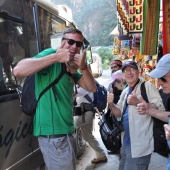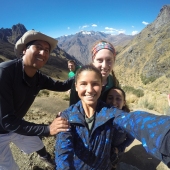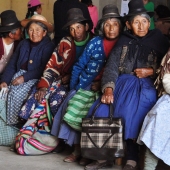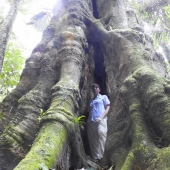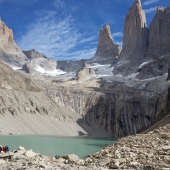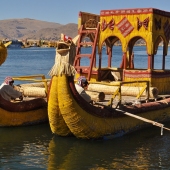
Mayor of Machu Picchu Threatens Hunger Strike to Protest Government Restrictions
Last week, when the story broke that the Mayor of Machu Picchu was threatening a hunger strike, it caught my attention. Dear Lord, what would Inca King Pachacutec say if he were alive today? Just how bad was it down there? Well, think about this. The only village near Machu Picchu is the town of Aguas Calientes. To go to this village is an adventure in itself. It's accessible only by train, unless you want to hike the Inca Trail, or take the jungle route which means walking 2-3 hours from Santa Teresa, after driving from Cusco 8 hours over a 15,000 ft mountain pass. It's called the jungle route for a good reason! The entire economy of that village is dependent solely on tourism. It's not like they have resources for generating temporary alternate income.
When the Peru government shut down Machu Picchu from February 1-14, everyone hunkered down to wait it out. But when the government extended the closure of Machu Picchu and all archaeological sites for another two weeks, Darwin Baca was desperate.
Baca is the Mayor and the man in charge of keeping the lights on, and conducting other municipal business like throwing out the trash. Aguas Calientes is home to around 4500 inhabitants and is located at the end of the train line. Hotels, restaurants, shops and homes for locals are squeezed in next to the tumbling Urubamba River. How can you run a city without funds? If Baca doesn't get money soon, he will have no choice but to lay off all workers.
Baca traveled to Cusco for a press conference. How he got there is unclear. Can he call up "Perurail" and order train service for one? Or did he hike 3 hours to Santa Teresa where he could hire a taxi or ride the local "colectivo" for 8 hours to Cusco? Imagine if the mayor of your city had to hike 3 hours, then ride 8 hours over a mountain pass to attend a meeting?
When Baca got to Cusco, he publicly declared just how dispicable it was to ignore the needs of the one village in Peru that relies solely on the flow of travelers on their way to and from the ancient Inca town of Machu Picchu.
“It is not enough to inflate your chest every time you talk about Machu Picch. It is not enough to say how beautiful it is. You also have to think about its inhabitants. Those who now do not have bread to put in their mouth. Those who lost almost one year when they closed their businesses and did not reopen them. President Sagasti turned on us. We are a people who are dedicated exclusively to tourism and now we have no way to survive," he quoted.
Out of curiosity, I wondered if anyone was buying Machu Picchu entry tickets online for the rest of the year. I went to the official government website where, as I expected, no tickets were available through February 28. But what about after that? I checked Easter holiday which is generally pretty busy, and only a handfull of tickets were sold. I also checked random dates in June, July and August which are typically the high season for travel. Very few tickets are sold.
With reduced capcity, there are 1116 tickets per day for foreign visitors and 1116 tickets per day for Peruvians/CAN citizens. Barely 5-10 tickets were sold on any given day. The Peru government is not generating money from Machu Picchu ticket sales.
In case anyone from the Peru government reads this, I am happy to explain why no one is buying tickets. Although tour operators are desperately trying to enourage interested people to travel, we are not planning to buy anything until the last minute. Here's why. For the last several months, the rules of entry to the country as well as access to archaeological sites has changed every month or even every two weeks. Predicting Peru's future border entry protocols is like predicting the stock market! Who wants to go through the hassle of buying, refunding, haggling and wasting time online? Not to mention managing the dissatisfaction of potential travelers.
Speaking as someone who has worked for a year without income, and survived by "living on love," I can tell you that our company, and others, are moving cautiously forward. We want people to come to Peru. But we don't want travelers to get caught in a system that doesn't know how to plan ahead and isn't signaling any interest in restoring tourism.
As Baca has indicated, and I can corroborate after my recent New Year's visit to Machu Picchu, the staff has done a great job of preparing the bio-safety measures beginning from the first step on board the half-empty trains. Machu Picchu is safer than any market, store or enclosed structure where humans currently congregate. There's truly no logical reason to keep it closed.
Let's hope that Sagasti takes action and Baca and his counterparts in the Sacred Valley will not need to resort to the drastic act of a hunger strike to solve their financial problems. I may have to join them.


